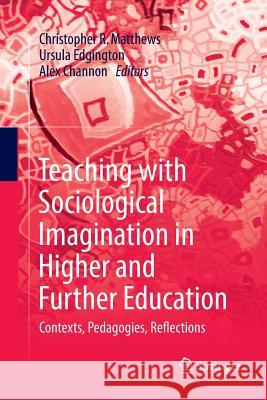Teaching with Sociological Imagination in Higher and Further Education: Contexts, Pedagogies, Reflections » książka
topmenu
Teaching with Sociological Imagination in Higher and Further Education: Contexts, Pedagogies, Reflections
ISBN-13: 9789811349393 / Angielski / Miękka / 2019 / 187 str.
Teaching with Sociological Imagination in Higher and Further Education: Contexts, Pedagogies, Reflections
ISBN-13: 9789811349393 / Angielski / Miękka / 2019 / 187 str.
cena 201,72
(netto: 192,11 VAT: 5%)
Najniższa cena z 30 dni: 192,74
(netto: 192,11 VAT: 5%)
Najniższa cena z 30 dni: 192,74
Termin realizacji zamówienia:
ok. 16-18 dni roboczych.
ok. 16-18 dni roboczych.
Darmowa dostawa!
Kategorie:
Kategorie BISAC:
Wydawca:
Springer
Język:
Angielski
ISBN-13:
9789811349393
Rok wydania:
2019
Wydanie:
Softcover Repri
Ilość stron:
187
Waga:
0.32 kg
Wymiary:
23.39 x 15.6 x 1.19
Oprawa:
Miękka
Wolumenów:
01
Dodatkowe informacje:
Wydanie ilustrowane











